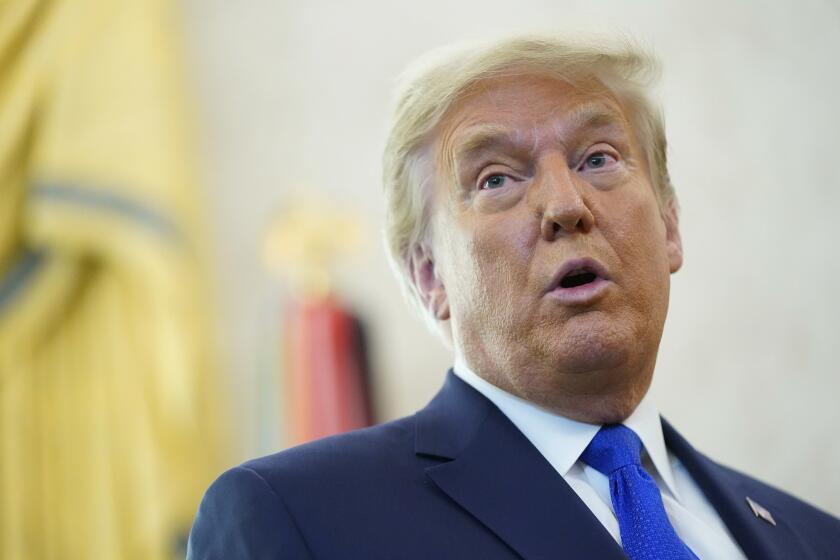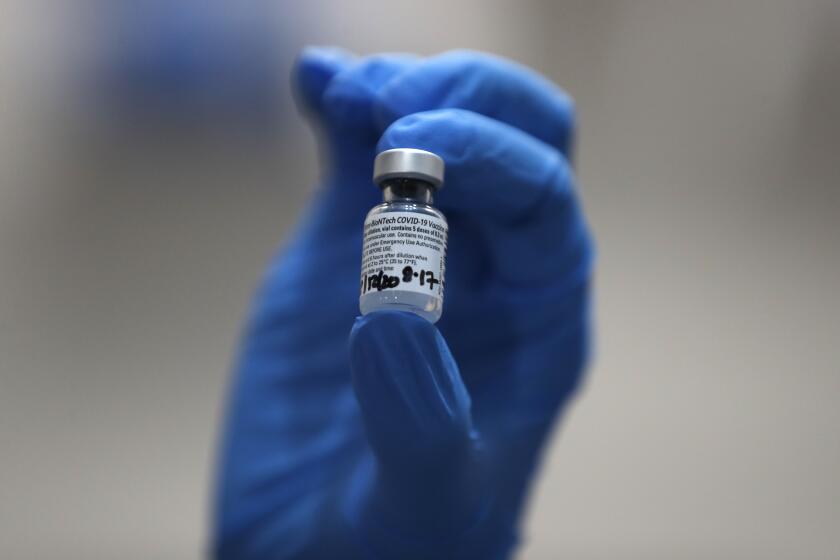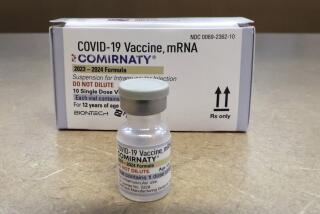U.S. panel endorses widespread use of Pfizer COVID-19 vaccine

- Share via
WASHINGTON — A U.S. government advisory panel has endorsed Pfizer’s COVID-19 vaccine, in a major step toward an unprecedented vaccination campaign that could finally conquer the outbreak.
The Food and Drug Administration is expected to follow the recommendation issued Thursday by its expert advisors. The advisory group, in 17-4 vote with one abstention, concluded that the shot appears safe and effective against the coronavirus in people 16 and older.
A final FDA decision is expected within days. Millions of shots would then ship to begin vaccinating healthcare workers and nursing home residents. Widespread access to the general public is not expected until the spring.
The meeting of outside advisors to the FDA represented the next-to-last hurdle before the expected start of the biggest vaccination campaign in U.S. history. Depending on how fast the FDA signs off on the panel’s recommendation, shots could begin within days.
The FDA panel functions like a science court. During the scheduled daylong session, it was expected to debate and pick apart the data — in public — on whether the vaccine is safe and effective enough to be cleared for emergency use. With unprecedented interest in the normally obscure panel, the FDA broadcast the meeting via Youtube, and thousands logged on.
“The American public demands and deserves a rigorous, comprehensive and independent review of the data,” said FDA’s Dr. Doran Fink, who described agency scientists working nights, weekends and over Thanksgiving to get that done.
The Trump administration opted last summer to pass up the chance to buy millions of additional doses of one of the leading coronavirus vaccine contenders.
The FDA is not required to follow the committee’s advice but is widely expected to do so. Once that happens, the U.S. will begin shipping millions of doses of the shot.
Later this month, the FDA is expected to pass judgment on another vaccine, developed by Moderna and the National Institutes of Health, that has proved about as protective as Pfizer’s. Vaccine candidates by Johnson & Johnson and AstraZeneca are also in the pipeline.
The initial supplies from Pfizer and Moderna will be limited and reserved mainly for healthcare workers and nursing home patients, with other vulnerable groups next in line until the shots become widely available on demand, something that will probably not happen until the spring.
The meeting of experts on vaccine development, infectious diseases and medical statistics came as the coronavirus continues surging across much of the world, claiming more than 1.5 million lives, including more than 291,000 in the U.S.
Hanging over the meeting was a warning from British officials that people with a history of serious allergic reactions shouldn’t get the vaccine. Government authorities there are investigating two reports of reactions that occurred on Tuesday when Britain became the first country in the West to begin mass vaccinations against the scourge.
Pfizer representatives told the panel they are aware of the British reports but have seen no signs of allergic reactions in their trial of the vaccine.
A positive recommendation and speedy U.S. approval appear nearly certain after FDA scientists issued an overwhelmingly positive initial review of the vaccine earlier this week.
FDA said results from Pfizer’s large, ongoing study showed that the shot, which was developed with Germany’s BioNTech, was more than 90% effective across people of different ages, races and underlying health conditions, including diabetes and obesity. No major safety problems were uncovered. Common side effects included fever, fatigue and pain at the injection site.
“The data presented in the briefing report were consistent with what we heard before and are really exciting,” said Dr. William Moss, head of Johns Hopkins University’s International Vaccine Access Center. “Nothing that I see would delay an emergency use authorization.”
The first COVID-19 vaccine could arrive in California this week. Here is how officials plan to handle the first wave of vaccinations.
The meeting also represented an opportunity for regulators to try to boost public confidence in the breakneck development process that has produced the Pfizer vaccine and a string of other upcoming shots with remarkable speed — less than a year after the virus was identified.
The FDA has also faced weeks of criticism from President Trump for not rushing out a vaccine before election day.
“There have been a lot of questions about why it takes us so long or are we being rigorous enough?” FDA Commissioner Stephen Hahn said in an interview. “I’m hoping that people will see with our transparency that we have taken a very rigorous stance on this.”
Hahn said the agency had already teed up the process to authorize the vaccine by filling out all the legal paperwork in advance, regardless of the ultimate decision.








